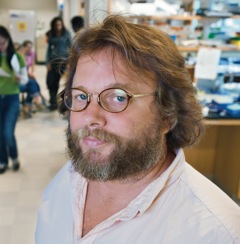
By
The lab of Professor of Biology Ken Williams, whose research focuses on the role of immunological cells in a range of illnesses that strike people living with HIV and AIDS, has been awarded a pair of grants totaling $4.6 million from the NIH’s National Institute of Neurological Disorders and Stroke.
Williams is the principal investigator on a five-year, $2.7 million award that marks the third round of funding for his lab’s research into monocyte and macrophage cells, which play important roles as part of the body’s immunological response.
One of the lead researchers in the Williams’ lab, Research Associate Professor of Biology Tricia Burdo, is the principal investigator on another NIH/NINDS award of $1.9 million over five years. That grant will fund a study of the role of the body’s immune response in a debilitating form of nerve damage suffered by people living with HIV.
Williams and his research team have linked the activity of macrophage and monocyte cells to the presence of debilitating conditions like dementia, cardiovascular disease and peripheral neuropathy, which strike patients living with HIV or AIDS even though they have effectively muted the virus with drug therapies.
The $2.7 million grant will support the Williams lab’s efforts to define the cell types in the brain that contribute to an HIV “viral reservoir,” which effectively harbors the virus even if it is almost undetectable in patients taking anti-retroviral therapy (ART) drugs.
Working with researchers at the University of California at San Francisco, the team will test the pairing of traditional ART drugs with and a new, orally administered form of a drug that specifically targets infected monocytes and macrophages. It would be the first time researchers have paired another drug with traditional ART in an effort to target the macrophage reservoir of HIV.
Burdo’s project will study the progression of peripheral neuropathy, which afflicts nearly seven out of 10 people living with HIV. Burdo said it’s important to pinpoint early and advanced stages of neuropathy with biomarkers, and explore potential drug therapies that could stop or slow the disease.



